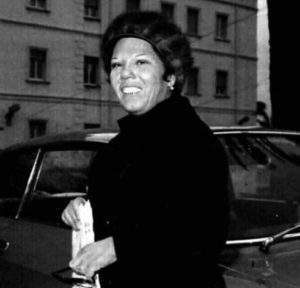Rosa Balistreri
Rosa Balistreri was born in Licata, Agrigento, on 21st March 1927, into a humble family: her father was a carpenter and her mother a housewife. From a young age, Rosa Balistreri showed a particular interest and talent for music and poetry. She began singing in the cafés and squares of Licata, conquering the public’s attention with her powerful and passionate voice. Her music was full of deep feelings and a strong Sicilian cultural identity.
She was married at the young age of sixteen to Gioacchino Torregrossa, with whom she had a daughter: Angela. Rosa tried to kill her husband when he gambled away their daughter’s dowry, so she was sentenced to some months of jail. When she got out of jail she started working as a housemaid in Palermo. At that time she was 32 years old and she learnt reading and writing, because, as she says in an interview, she was feeling the need to know texts, starting from the alphabet and from her name. Rosa was forced to emigrate to Florence in the Fifties. There she met many intellectuals and she took part in a Dario Fo’s show of folk songs. This is the turning point of Rosa’s life. She takes the guitar to give her voice to those who are without voice: the poorest people, her fellow-citizens living in the south of Italy where they are full of injustice and oppression. Her voice becomes images and tells stories seeking justice and truth.
In 1971 she came back to Palermo and started to work with some important figures in Sicily: she sang songs written by the poet Ignazio Buttitta and she was supported by the writers Leonardo Sciascia and Andrea Camilleri and by the painter Renato Guttuso. Her soulful and deep voice sings about Sicily in Sicilian, talking about poverty and injustice. She defines her one as a voice of protest fighting for lower classes, poor people and women. She is a folk singer that takes the heritage of “cuntisti” (traditional storytellers), being able to hold the attention of the audience with her passion and the depth of her voice. She died in Palermo on 20th September 1990.


